Stop Panicking in the Kitchen and Learn to Love your Mistakes
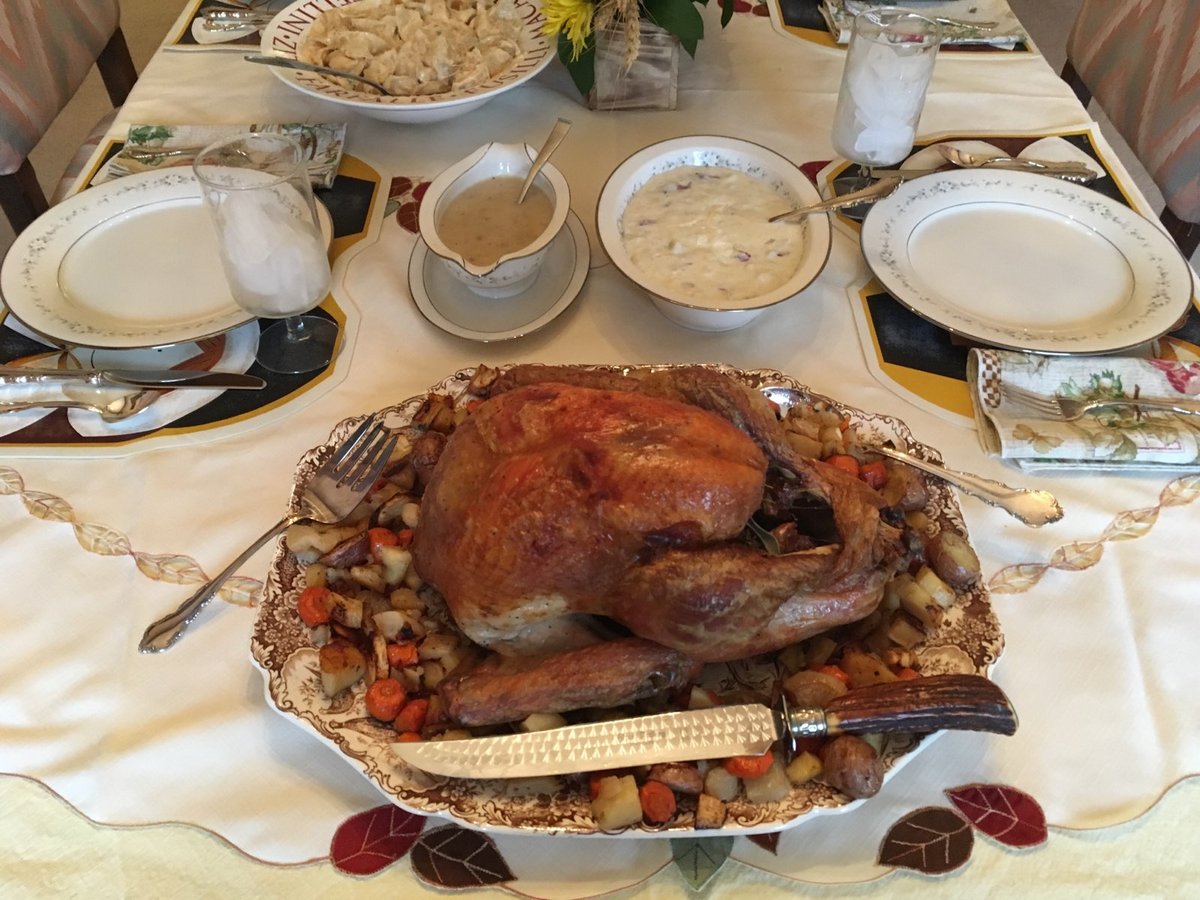
With Thanksgiving over, I, like many of you, just returned to work from spending time with my family. While our holiday meal was not at all traditional and quite small, we did roast a whole turkey. It was quite a feat for the 1960’s era oven in my aunt’s home! After a day of working in the kitchen and the house smelling like heaven for hours, we finally sat down to enjoy the fruits of our labor, and at the center of the table was a perfectly brown, crisp skinned, juicy turkey. I had the honor of carving the bird, and as I did, I could tell something was not quite right.

The breast meat seemed to be shorter than the skin that was over it, and there was an iron-y smell that came from the bird once I pierced the top of the breast to remove the wish bone. Within seconds I had diagnosed the problem and was absolutely mortified: I had forgotten to remove the bag of giblets from the cavity in the turkey. In front of my entire family, I had fallen victim to one of the classic Thanksgiving blunders!
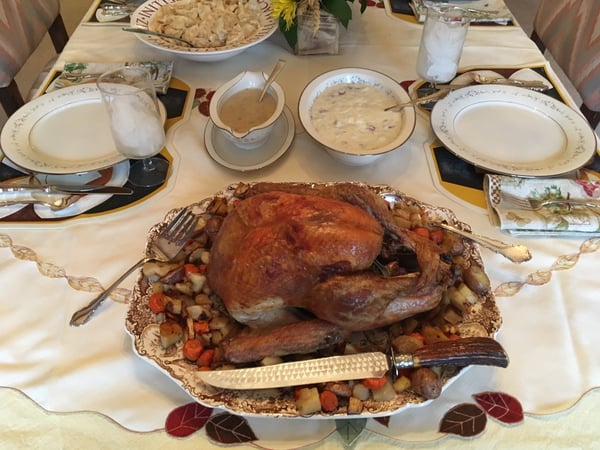
I felt the same emotion that I see on the faces of many of our students at The Chopping Block when a mistake is made in the kitchen: complete embarrassment and a sense of impending doom that the meal you have just worked so hard on is completely ruined by making one silly mistake. While this story is certainly entertaining, and was quite embarrassing to me at the time, it does have a moral to it and that's we all make mistakes when we cook. From the most novice home cooks to fine dining chefs to myself (and I teach people how to cook for a living!), we all mess up from time to time, and that is okay!
Luckily, the giblets were inside a wax paper bag instead of a plastic one, and had not, as I had feared, ruined our Thanksgiving turkey. In fact, they actually added a very interesting aroma to the bird that was quite welcome around our table. I'm not telling you to intentionally leave a bag of giblets in your turkey next Thanksgiving, but rather understand that many mistakes in the kitchen turn out to not at all impact the overall flavor and enjoyment of your meal. Many of them can unintentionally enhance your meal, and so many mistakes can be fixed quite simply with good kitchen knowledge and proper seasoning.
Seasoning
Seasoning is a much-misunderstood element of cooking, so I’ll start with a quick definition so we can all be on the same page. Seasoning is the application of salt (or salty foods like bacon, cured meats, cheeses), acid (e.g. lemon juice, sour cream, vinegar), or sweetness (e.g. sugar, syrups, honey) to food in order to improve the overall flavor of the food it is being applied to. I would say most mistakes that happen with cooking at home stem from a misunderstanding of seasoning, however, that is easily remedied.
For example, if you find your homemade salad dressing to be far too tangy (i.e. it tastes like nothing but vinegar), don't wallow that you got a bad recipe and never return to it again. There is a very simple solution: either add more oil or a teaspoon or two of honey in order to dilute the offending vinegar. The sweetness of the honey will balance the harsh acidity of the vinegar, and bring out some of the more nuanced flavors that vinegar was hiding from you. The balancing of sweetness and acidity works the other way as well, where a squeeze of lemon juice or a teaspoon of your favorite vinegar can help offset overly sweetened pastries, sauces, cole slaws, etc.
Finding the balance between these two flavors can make a massive impact in your cooking, and fix many a dish, however, salt is a different ball game. Salt is the most important seasoning element. It makes food taste more like itself, but it unfortunately does not have a balancing partner like sweetness and acidity do. There are techniques to fixing overly salted items, like adding a peeled, raw potato to a pot of sauce or soup that is too salty in order to draw up some of the excess salt, or adding a tablespoon of unsalted butter to a sauce in order to reduce how much salt is picked up by our tongues, but these techniques are unreliable, and don’t work if you have oversalted a piece of meat or a vegetable. The only way to have properly salt levels for ingredients like those, unfortunately, is trial and error. However, when you find the level of salt you like on your foods, you will be able to easily replicate it time and time again, simply by tasting them and adjusting the salt. That last point is an important one. Taste your food. Think about the sweetness, acidity, and most importantly salt level of your food and adjust the levels of all three to your liking. Our popular Flavor Dynamics class dives deep into these tastes and tells you how to adjust flavors in your food for optimal enjoyment.
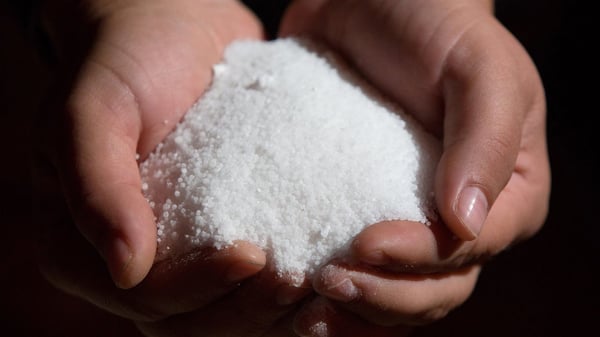
Proper seasoning will fix 80% of drastic mistakes in the kitchen. It's that simple. For the other 20%, professional cooks have clever techniques and cheats that work quite well, and while we don’t have time here to go over them all, I can address some of the most common issues I find home cooks run into and give you some tips and tricks on how to avoid or correct them.
Burnt Garlic
Our students ask me this all the time: how can I avoid burning my garlic at home? I have two suggestions for you. If the recipe calls for minced garlic, but you are going to be sautéing the garlic, add the garlic to the pan for one or two minutes maximum, and don’t use a garlic press. Garlic only needs to cook until it's fragrant to be a lovely addition to most sautéed dishes, and one or two minutes is more than enough to make that happen. Using a garlic press will produce very tiny pieces of garlic, prone to burning. Opt instead for a coarser mince, and you should be in the clear, every time.
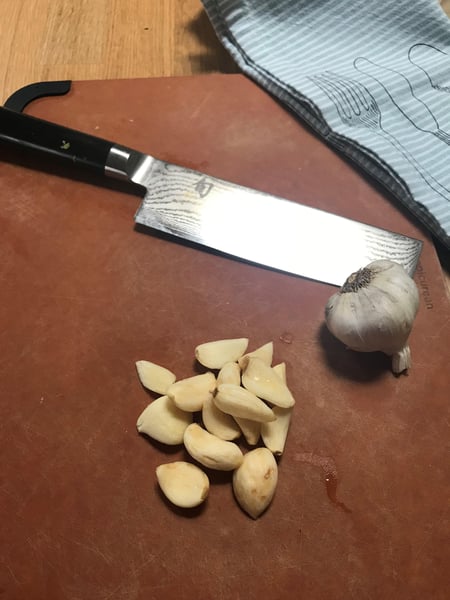
Gummy Mashed Potatoes
Proper mashed potatoes are the epitome of luxury, but many times at home our mashes come out gloppy, gummy, and not at all enjoyable. There are two key factors in avoiding this: one is the potato you use. Starch content in many potatoes isn’t right for mashed potatoes, so I suggest sticking to tried and true russet potatoes, which will come out perfect every time. The second factor is how you mash your potatoes. At all costs, avoid food processors and electric mixers, as these will yield the undesirable gumminess. Instead, stick to a traditional hand masher, or make the investment in a ricer or food mill, which work by pressing the potatoes through small holes. These techniques will yield a light, fluffy, not at all gloppy mashed potato.
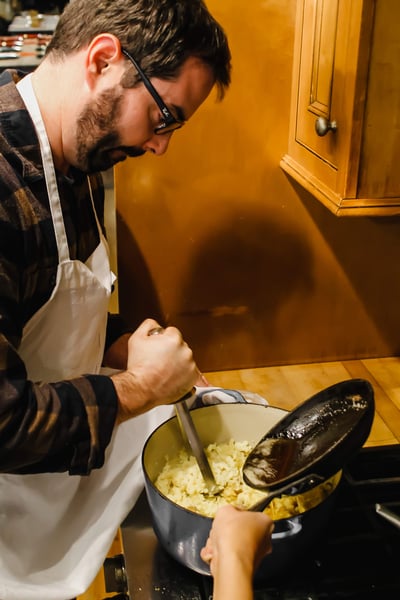
I hope these tips and tricks can add some confidence to your home cooking, and help you realize that not every decision in the kitchen is a life and death one. We live in an age where there are very few new discoveries in the world of cooking, and if you are struggling with a specific dish, someone has struggled the same way before you. The internet is a fantastic resource for home cooks, as are restaurants, chefs, and cooking schools like The Chopping Block, especially our Culinary Boot Camp week-long class.
Don’t ever be discouraged by failure in the kitchen, because someone out there, either in your town or city or on the internet has the answers for why your omelet is sticking in the pan or how to make the dish you ate at the restaurant last night and haven’t been able to stop thinking about. With just a little bit of research online or talking to chefs, you can improve the food you cook at home drastically. So, go forth, season properly, ask questions about and research food, overcome the fear of mistakes in the kitchen, and remember, take the giblets out of your holiday turkey.

